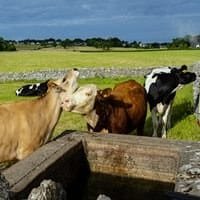(BRUSSELS) – Strategic plans under the EU’s Common Agricultural Policy (CAP) are supporting farmers in their transition towards a more sustainable farming model, according to a Commission report Thursday.
The report analyses the intended impact of the CAP Strategic Plans for delivering on CAP goals for 2023-2027, particularly those linked to environment, climate and animal welfare.
For 2023-2027, the CAP is supported by 307 billion, of which 264 bn is from the EU budget, and an additional 43 billion from national funds. About 2,500 interventions have been designed in the 28 CAP Strategic Plans submitted by Member States and approved by the Commission.
Overall, CAP Strategic Plans show a significant joint effort to support farm income, says the report, and to ensure a fairer distribution to smaller farms and reduce income disparities in vulnerable and disadvantaged areas.
On average, agricultural income is only 45% of the average wage in the economy, with variations between different agricultural sectors and farming systems. In 2020, CAP support accounted for 23% of EU farm income on average. It proves key to maintain agricultural activity and jobs in remote rural areas, slowing down land abandonment and rural depopulation.
More than 10% of EU direct payments, representing 4 billion annually, will be reallocated through redistributive payments benefiting small and medium-sized farms. This payment has more than doubled compared to the previous period. The Plans will support 377,000 young farmers in setting up in agricultural activity.
To receive full CAP payments, farmers must respect an enhanced set of requirements and standards for the environment, climate, health, animal welfare, and decent working conditions.
The Plans allocate 32% of the total CAP budget to voluntary actions advancing the environmental, climate and animal welfare objectives. The largest financial contribution comes from eco-schemes and environmental and climate commitments under rural development, with 44.7 billion and 33.2 billion respectively.
Portugal, Bulgaria, Croatia, Cyprus, Greece and Slovenia plan to promote organic fertilisers as an alternative to synthetic ones. Germany supports both investment and maintenance aid for agroforestry. Finland has a scheme for winter cover to protect soil while Spain offers extra funding for sustainable grazing and mowing practices on pasture to reduce soil degradation and improve biodiversity. One Polish eco-scheme provides significant support for better living conditions of livestock.
In terms of the EU Green Deal 2030 ambitions, the Plans will contribute to reaching the target of 25% of EU agricultural area farmed organically. By 2027, an estimated 10% of the EU’s farmland should receive CAP support for organic production, up from 5.6% in 2020. Complementary national initiatives on market development and public procurement will help to achieve the overall target.
28 CAP Strategic Plans at a glance
Summary overview of the approved 28 CAP Strategic Plans, Facts and Figures
Mapping and analysis of CAP Strategic Plans. Assessment of joint efforts for 2023-2027
Executive summary of the mapping and analysis of the CAP Strategic Plans


